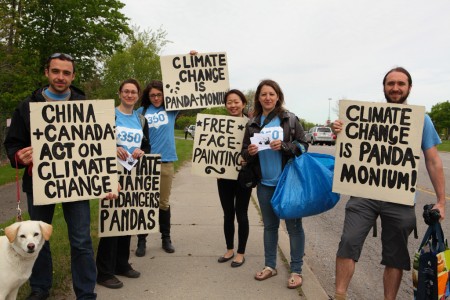Rather, it is the endpoint of joined-up thinking about climate science and energy policy.
On Twitter the other day, Suzy Waldman said: “Trying to envision middle ground between idea coalsands ought 2b shuttered and idea Canada’s economic fate depends on them”.
I think this perspective risks perpetuating one of the big problems in Canadian climate and energy politics – namely, the assumption that the oil sands have a legitimate future part to play in Canada’s economy and that any position that questions that is ‘extreme’ and outside the political middle ground. This may be true in terms of opinion polls and the positions of politicians, but this is because people haven’t really accepted that our current trajectory ends with planetary catastrophe.
We now have very clear and credible evidence that warming the planet by more than 2°C virtually guarantees big trouble for humanity. Crossing that threshold can be achieved by burning a fraction of the conventional oil, gas, and coal available on the planet. In short, then, we have a dangerous amount of fossil fuel available without even tapping unconventional sources like the oil sands.
Stabilizing the climate at any level of temperature increase means cutting greenhouse gas pollution to the point where the amount produced each year is absorbed by natural systems and so there is no net change in the concentration. Achieving that requires very deep cuts – essentially, the global phaseout of fossil fuel use. Stabilizing below the 2°C limit requires that all this happen extremely quickly. In such a world, it simply makes no sense to be building bitumen mining and in situ extraction facilities intended to operate for decades. Nor does it make sense to keep building pipelines to export fuels that we cannot afford to burn, if we wish to maintain a livable planet capable of sustaining human prosperity indefinitely.
This connects to the biggest problem with the oil sands: the way in which they contribute to a vicious cycle. We build more fossil fuel production capacity, so naturally we need to have transport and export capacity to serve it. The availability of fossil fuels then encourages people to keep investing in vehicles, power plants, and other facilities and equipment that require them. And so fossil fuel dependence is perpetuated.
If we are to avoid catastrophic climate change, we need to rapidly reverse that cycle. We need to be shutting down production capacity, and transport capacity, and facilities and equipment that depend on fossil fuels. That will probably make some things a lot more expensive and change the ways in which people live, but the alternative of a planet with a permanently hostile climate is clearly much worse.
Shutting down the oil sands is an extreme idea politically in Canada, but that is simply evidence of how poor the scientific basis for Canada’s energy politics is.


